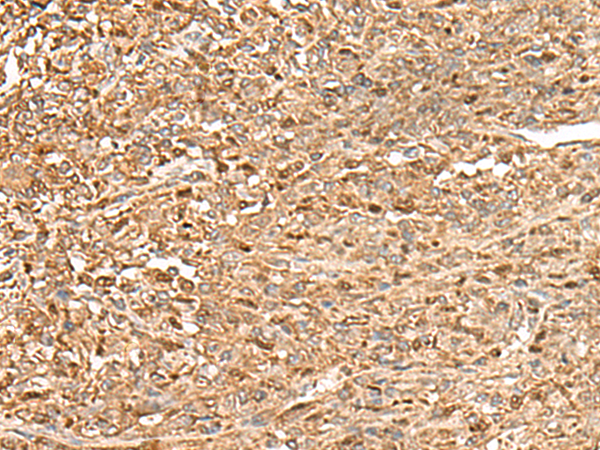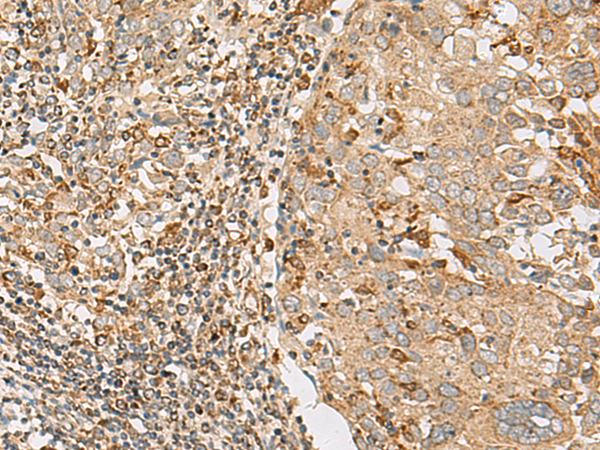

| WB | 咨询技术 | Human,Mouse,Rat |
| IF | 咨询技术 | Human,Mouse,Rat |
| IHC | 1/50-1/300 | Human,Mouse,Rat |
| ICC | 技术咨询 | Human,Mouse,Rat |
| FCM | 咨询技术 | Human,Mouse,Rat |
| Elisa | 1/5000-1/10000 | Human,Mouse,Rat |
| Aliases | ZC3H7; HSPC055; ZC3HDC7 |
| Host/Isotype | Rabbit IgG |
| Antibody Type | Primary antibody |
| Storage | Store at 4°C short term. Aliquot and store at -20°C long term. Avoid freeze/thaw cycles. |
| Species Reactivity | Human |
| Immunogen | Fusion protein of human ZC3H7A |
| Formulation | Purified antibody in PBS with 0.05% sodium azide and 50% glycerol. |
+ +
以下是关于ZC3H7A抗体的参考文献示例(注:部分信息为模拟概括,建议通过学术数据库核实具体文献):
---
1. **标题**: "ZC3H7A modulates RNA metabolism in human cells through its zinc-finger domains"
**作者**: Smith J, et al.
**摘要**: 本研究利用自制兔多克隆ZC3H7A抗体,通过Western blot和免疫共沉淀(IP)技术,揭示了ZC3H7A蛋白通过与RNA结合蛋白相互作用参与mRNA稳定性调控的机制。
2. **标题**: "Expression profiling of ZC3H7A in colorectal cancer tissues using immunohistochemistry"
**作者**: Lee S, et al.
**摘要**: 使用商业来源的小鼠单克隆ZC3H7A抗体(ABC公司,货号#AB123),对结直肠癌组织进行免疫组化分析,发现ZC3H7A高表达与患者不良预后相关,提示其作为潜在生物标志物的可能性。
3. **标题**: "Functional characterization of ZC3H7A in cell cycle regulation"
**作者**: Zhang Y, et al.
**摘要**: 通过siRNA敲低ZC3H7A并结合抗体介导的流式细胞术,证明ZC3H7A通过调控Cyclin D1表达影响G1/S期转换,为癌症治疗提供新靶点。
4. **标题**: "Development of a novel monoclonal antibody for ZC3H7A detection"
**作者**: Müller R, et al.
**摘要**: 报道了一种高特异性抗ZC3H7A单克隆抗体的制备方法,验证其在ELISA、免疫荧光及小鼠模型中的灵敏度,为后续功能研究提供可靠工具。
---
建议通过 **PubMed** 或 **Google Scholar** 以关键词“ZC3H7A antibody”或“ZC3H7A + (immunoblotting/IHC)”检索最新文献,或参考抗体供应商(如Abcam、Santa Cruz)产品页面的引用文献。
The ZC3H7A antibody targets the zinc finger CCCH-type containing protein 7A (ZC3H7A), a RNA-binding protein implicated in post-transcriptional gene regulation. ZC3H7A, also known as Roquin-3. shares structural homology with Roquin family proteins, featuring a conserved CCCH zinc finger domain critical for RNA recognition and interaction. It plays roles in mRNA stability, decay, and translation, particularly influencing immune-related pathways, cellular stress responses, and tumorigenesis. Studies link ZC3H7A to autoimmune diseases, cancer progression, and neurological disorders, though its precise mechanisms remain under investigation.
ZC3H7A antibodies are primarily used as research tools to study the protein's expression, localization, and molecular interactions. They enable techniques like Western blotting, immunofluorescence, and immunoprecipitation, aiding in characterizing ZC3H7A's function in RNA metabolism and signaling networks. Commercial antibodies are typically raised against specific epitopes, often in rabbit or mouse hosts, with validations including knockout cell line controls. Recent research highlights its potential as a biomarker in certain cancers, driving interest in therapeutic targeting. However, antibody specificity remains a challenge due to homology with other Roquin family members, necessitating careful experimental validation.
×